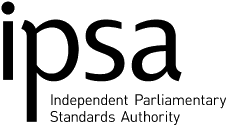Independent Parliamentary Standards Authority
 | |
| Agency overview | |
|---|---|
| Formed | 2009 |
| Jurisdiction | United Kingdom |
| Headquarters | 30 Millbank London |
| Employees | 50 |
| Agency executives |
|
| Website | http://www.parliamentarystandards.org.uk/ |
.svg.png) |
| This article is part of a series on the politics and government of the United Kingdom |
|
|
|
|
The Independent Parliamentary Standards Authority (IPSA) is an independent body created by the Parliamentary Standards Act 2009, largely as a response to the parliamentary expenses scandal of 2009. It establishes and monitors the expenses scheme for Members of the House of Commons, and is responsible for paying their salaries and expenses. Following revisions to the Parliamentary Standards Act in April 2010 (via the Constitutional Reform and Governance Act 2010), IPSA was also given responsibility for setting the level of MPs' salaries.
Role
IPSA is responsible for: setting the level of and paying MPs’ annual salaries; paying the salaries of MPs' staff, drawing up, reviewing, and administering an MPs’ allowances scheme; providing MPs with publicly available information relating to taxation issues; and determining the procedures for investigations and complaints relating to MPs.
Upon its formation IPSA took over some of the functions previously undertaken by the House of Common's Fees Office, as well as some of the staff who previously carried out these functions.
Consultation
IPSA is required by statute to consult with certain bodies when setting the expenses scheme. In addition to consulting with this group, IPSA invited the public to respond to the consultation. The consultation was open from 4 January until 11 February 2010.
In June 2010 IPSA launched three further consultations, on amendments to the expenses scheme; proposals on publication; and on the compliance officer's processes.
Report of the Committee on Standards in Public Life
Sir Christopher Kelly, the Chairman of the Committee on Standards in Public Life, published a report on 4 November 2009 looking at MPs' expenses. His report had no formal powers, but provided recommendations to IPSA, and was used to inform the final allowances scheme prepared by IPSA.
Publication of first expenses scheme
IPSA published their first expenses scheme on 29 March 2010.[1] It had a largely positive reaction from MPs, the media, and the general public, although there was some criticism of the continued ability of MPs to employ one family member.[2]
Criticism
IPSA has been criticised publicly by many MPs, including David Cameron, who told IPSA to "...get a grip on what they are doing and do it fast.".[3] Criticism has been largely centred on the perceived high running costs of IPSA, inability of MPs to get through on the IPSA helpline, emails and letters going largely unanswered, and the length of time taken to reimburse expenses.
Governance
- IPSA Chair: Professor Sir Ian Kennedy.[4]
- IPSA Chief Executive: Marcial Boo.[5]
- IPSA Board members: Sir Neil Butterfield, Elizabeth Padmore, Anne Whitaker, Professor Tony Wright.[6]
- Former IPSA Board members: Rt Hon Scott Baker, Ken Olisa, Jackie Ballard, Professor Isobel Sharp.[7]
See also
- Parliamentary Commissioner for Standards
- Committee on Standards and Privileges
- Parliamentary expenses scandal
- Parliamentary Standards Act 2009
- Speaker's Committee for the Independent Parliamentary Standards Authority
References
- ↑ "Foreword". Independent Parliamentary Standards Authority. 29 March 2010. Retrieved 25 May 2010.
- ↑ Shipman, Tim (30 March 2010). "Employment of family members". London: Daily Mail. Retrieved 18 June 2010.
- ↑ "David Cameron tells expenses watchdog: Get a grip". BBC News. 14 July 2010. Retrieved 2013-05-20.
- ↑ "Chairman". Independent Parliamentary Standards Authority. Retrieved 25 May 2010.
- ↑ "Interim Chief Executive". Independent Parliamentary Standards Authority. Retrieved 25 May 2010.
- ↑ "Board Members And Chief Executive". Independent Parliamentary Standards Authority. Retrieved 23 December 2013.
- ↑ Groves, Jason (14 November 2012). "Four Quit Expenses Watchdog". London: Daily Mail. Retrieved 13 December 2013.